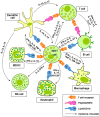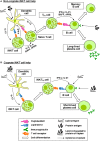Activation and Regulation of B Cell Responses by Invariant Natural Killer T Cells
- PMID: 29967611
- PMCID: PMC6015876
- DOI: 10.3389/fimmu.2018.01360
Activation and Regulation of B Cell Responses by Invariant Natural Killer T Cells
Abstract
CD1d-restricted invariant natural killer T (iNKT) cells play central roles in the activation and regulation of innate and adaptive immunity. Cytokine-mediated and CD1d-dependent interactions between iNKT cells and myeloid and lymphoid cells enable iNKT cells to contribute to the activation of multiple cell types, with important impacts on host immunity to infection and tumors and on the prevention of autoimmunity. Here, we review the mechanisms by which iNKT cells contribute to B cell maturation, antibody and cytokine production, and antigen presentation. Cognate interactions with B cells contribute to the rapid production of antibodies directed against conserved non-protein antigens resulting in rapid but short-lived innate humoral immunity. iNKT cells can also provide non-cognate help for the generation of antibodies directed against protein antigens, by promoting the activation of follicular helper T cells, resulting in long-lasting adaptive humoral immunity and B cell memory. iNKT cells can also regulate humoral immunity by promoting the development of autoreactive B cells into regulatory B cells. Depletions and functional impairments of iNKT cells are found in patients with infectious, autoimmune and malignant diseases associated with altered B cell function and in murine models of these conditions. The adjuvant and regulatory activities that iNKT cells have for B cells makes them attractive therapeutic targets for these diseases.
Keywords: B cells; CD1d; antibodies; disease; glycolipids; invariant natural killer T cells.
Figures


Similar articles
-
Functions of CD1d-Restricted Invariant Natural Killer T Cells in Antimicrobial Immunity and Potential Applications for Infection Control.Front Immunol. 2018 Jun 6;9:1266. doi: 10.3389/fimmu.2018.01266. eCollection 2018. Front Immunol. 2018. PMID: 29928278 Free PMC article. Review.
-
Combined proinflammatory cytokine and cognate activation of invariant natural killer T cells enhances anti-DNA antibody responses.Proc Natl Acad Sci U S A. 2020 Apr 21;117(16):9054-9063. doi: 10.1073/pnas.1920463117. Epub 2020 Apr 15. Proc Natl Acad Sci U S A. 2020. PMID: 32295878 Free PMC article.
-
Can invariant Natural Killer T cells drive B cell fate? a look at the humoral response.Front Immunol. 2025 Feb 18;16:1505883. doi: 10.3389/fimmu.2025.1505883. eCollection 2025. Front Immunol. 2025. PMID: 40040714 Free PMC article. Review.
-
Invariant natural killer T cells balance B cell immunity.Immunol Rev. 2021 Jan;299(1):93-107. doi: 10.1111/imr.12938. Epub 2021 Jan 12. Immunol Rev. 2021. PMID: 33438287 Free PMC article. Review.
-
Cognate interaction with iNKT cells expands IL-10-producing B regulatory cells.Proc Natl Acad Sci U S A. 2015 Oct 6;112(40):12474-9. doi: 10.1073/pnas.1504790112. Epub 2015 Sep 21. Proc Natl Acad Sci U S A. 2015. PMID: 26392556 Free PMC article.
Cited by
-
Transnuclear mice reveal Peyer's patch iNKT cells that regulate B-cell class switching to IgG1.EMBO J. 2019 Jul 15;38(14):e101260. doi: 10.15252/embj.2018101260. Epub 2019 May 31. EMBO J. 2019. PMID: 31304630 Free PMC article.
-
T Cell Responses to Mycobacterial Glycolipids: On the Spectrum of "Innateness".Front Immunol. 2020 Feb 11;11:170. doi: 10.3389/fimmu.2020.00170. eCollection 2020. Front Immunol. 2020. PMID: 32117300 Free PMC article. Review.
-
NKT Cells in Neurological Diseases.Front Cell Neurosci. 2019 May 29;13:245. doi: 10.3389/fncel.2019.00245. eCollection 2019. Front Cell Neurosci. 2019. PMID: 31231193 Free PMC article. Review.
-
High metabolic activity in positron emission tomography and systemic inflammation occurring years after exposure cessation in engineered stone silicosis.Sci Rep. 2025 Jul 14;15(1):25364. doi: 10.1038/s41598-025-10562-5. Sci Rep. 2025. PMID: 40659713 Free PMC article.
-
IL-27 regulates the differentiation of follicular helper NKT cells via metabolic adaptation of mitochondria.Proc Natl Acad Sci U S A. 2024 Feb 27;121(9):e2313964121. doi: 10.1073/pnas.2313964121. Epub 2024 Feb 23. Proc Natl Acad Sci U S A. 2024. PMID: 38394242 Free PMC article.
References
Publication types
LinkOut - more resources
Full Text Sources
Other Literature Sources

